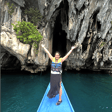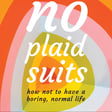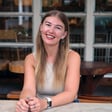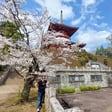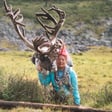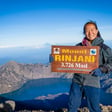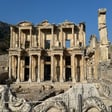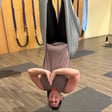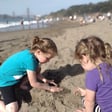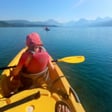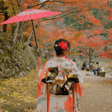Become a Creator today!Start creating today - Share your story with the world!
Start for free
00:00:00
00:00:01

One Womans Journey To Connecting With Her Ancestry
Join us as Brittany, tells her story of longing to connect to her grandmothers Native American heritage, and her journey of discovery, learning, and embracing the indigenous community of Arizona. Brittany, a teacher, moved to a reservation to teach, and still works daily on amplifying indigenous voices.
Transcript
Brittany's Travel Transformation
00:00:01
CHANTELLE KINCY
Hi, welcome to Go Far Girl. Today I'm here with Brittany and she's here to talk to us all about the Southwest and how that aspect of the country has changed her view on the world and travel itself.
00:00:11
CHANTELLE KINCY
Brittany is the founder of Travel the Southwest. It's a travel blog dedicated to hidden gems across the American Southwest. Raised near the Salton Sea and now based in Arizona, she brings a deep personal connection to the region.
00:00:23
CHANTELLE KINCY
with a focus on Southern California, Arizona, New Mexico, Utah, and Colorado.
Promoting Responsible Travel
00:00:28
CHANTELLE KINCY
Brittany highlights lesser-known destinations, state parks, scenic byways, indigenous lands, and small towns, offering travelers a richer, more respectful way to explore.
00:00:38
CHANTELLE KINCY
Her mission is to promote mindful travel that supports local communities, honor Native cultures, and celebrates the natural beauty and diversity of the region. I love the Southwest, so I'm super excited to dig a little deeper.
00:00:50
CHANTELLE KINCY
we are going to get to share two different episodes with Brittany because she has so many amazing
Early Influences and Cultural Connections
00:00:54
CHANTELLE KINCY
stories. I couldn't compact it all into one. But in this episode, Brittany's going to share with us a really powerful story of early travel experiences that kind of opened her eyes to challenging realities, ultimately helped her find her voice and purpose.
00:01:07
CHANTELLE KINCY
So I'm just going to turn it over to Brittany and let her take us back to your first visit on the reservation and kind of give us a little background there.
00:01:17
Brittany
Sure thing. So nice to meet you. I guess I have met you, but already know you, but so good to be here, I should say.
00:01:21
CHANTELLE KINCY
Yeah. ah Thanks for being here.
00:01:23
Brittany
Yeah. So I'll Yeah, so I'll say my first visit to that reservation, i lived in, on the White Mountain Apache Reservation, Fort Apache technically, but the White Mountain Apache people.
00:01:35
Brittany
And my first visit to that reservation was actually pretty late on in my journey to really learn more about those cultures. So I have to go way back. I was raised by my grandma.
00:01:44
CHANTELLE KINCY
Let's do it.
00:01:46
Brittany
was raised my grandma and my grandma was Shawnee. And she always had that part of her life kind of taken from her because she didn't really know her father. And back in the 50s, some of us can't even comprehend this now, but um interracial relationships were illegal, right? You could not marry outside of your race. So my the way that my grandma grew up was that, okay, that just didn't happen. And it was kind of like you're out of you're out of your that part of your family's life, which is really sad to think about, that she had this whole part of her heritage that she really never knew.
00:02:17
Brittany
So when i was growing up with her, we really tried to pursue that as much as we could, right? We went to powwows as much as we could. And I know you may not be able to see me depending on where you're watching or listening, but I'm very much a white woman, right? Like you look at me and you say blondish hair, blue eyes, right?
00:02:32
Brittany
But my grandma... we had this little look into, you know, a whole, really a whole other world and culture than what I knew. um So that was already interesting. And I always had an interest in it.
00:02:43
Brittany
I wanted to connect to that part of not even really my heritage, but her heritage, because I just, you know, i I loved that part. I loved how curious she was about it. And that really led me to want to travel more of the Southwest, which funny enough, I didn't really do until really the last like 10 years, because I kept traveling abroad and like doing all these seasonal chops.
00:03:01
Brittany
So yeah,
00:03:02
CHANTELLE KINCY
I know.
00:03:04
Brittany
It's really only recently that I'm like, okay, no, i'm really going to commit to like getting to know my home because I'm going to live here for the foreseeable future. So that's how far back it goes. And I would just get these little snippets, you know, like one visit to this place here and there, one visit to this reservation. Okay. Learn a little bit about that tribe.
00:03:21
Brittany
And then when I started really learning and digging and getting into maps and things, cause I'm also a map nerd. Like I will just spend like, so like an hour looking at maps. I realized that actually where I grew up,
00:03:32
Brittany
I was right across from another reservation. So I started learning more about like land rights and and how that affects so many things and how travel and tourism are so inextricably linked to these different things that we maybe don't consider, especially if we're in the tourism industry, like for those of us who are listening, who are travel bloggers and things too.
00:03:51
Brittany
um So yeah, so lots of little little touch points throughout my life. And then when I was working a full-time job actually in parks and community rec, which I thought was my, one of my dream jobs, funny enough, ah my grandmother passed away pretty suddenly. And that really wrecked me and rocked me at that point. She had been like my mother, right?
00:04:13
Brittany
Um, and I realized like, wow, there were all these things I said I wanted to do that I was interested in. and I realized I hadn't really been pursuing them. I was spending so much time working, you know, thinking about basically how to make money.
00:04:25
Brittany
Um, so I was like, okay, I need, to I need to like figure this out. I want to spend more time with my family because you never know how much time you actually have left with them. I want to spend time with my birth mother because I didn't really get to know her.
00:04:37
Brittany
So all of these factors were like, basically I need to have a new job and a new life and Thankfully, my husband so supportive and was like, okay, let's, let's move, you know? So I started looking for jobs.
00:04:49
Brittany
I looked for teaching jobs because that made sense with what I was doing as a good, like a pretty easy transition. Although if anyone who's been a teacher knows teaching is not easy. So let me just say easy. Okay. Um, but yeah, so I was looking at that and I found a few jobs on the reservation and I was like, oh yeah, that is actually something I'm really interested in learning more about.
00:05:10
Brittany
Um, and my mom actually like nudged me and said, Hey, there's a job because she was invested in this too, right? She wanted me to live closer to her. So she said, actually, yeah.
00:05:17
CHANTELLE KINCY
Of course.
00:05:19
Brittany
So she said, well, there's actually a job like 40 minutes, um, North of me, wait North, nope, South, uh, 40 minutes South of me. And she said, Hey, if you, If you take that, they actually have housing and things. And I was like, oh, okay, I'm intrigued.
00:05:34
Brittany
So yeah, so I started applying to jobs on the reservation, i was hired from one of them on the spot. And I just said, okay, that's what I'm doing. So, and then I didn't even say this part. Yeah, I skipped that part of my story, but like also between the time when my grandma died, like three weeks before that, I had also gone on my first international Europe trip.
00:05:53
Brittany
So that was another little peek inside of like, wow, I've really been working so much that haven't taken the time to really like enjoy things. so it wass like that. with my grandma passing. And I was like, okay, breaking point, I need change. So that really uprooted me.
00:06:05
Brittany
And then fast forward to actually living on the reservation first year, being a first year teacher, and then also living in a completely different culture and having to adjust to really a different like set of priorities by the culture there than I had been used to. I was living in Phoenix before that.
00:06:21
Brittany
um that whole thing rocked me. But the cool thing is, it forced me to slow down a lot, it forced me to really get introspective and curious and, um and question things, I guess, think things that I thought were just assumed to be true.
00:06:34
Brittany
um Yeah, it's amazing how reservation specifically, you can be just a few minutes away from being off the res, and they really are two completely different worlds, different cultures, and even technically legally different nations because
Life and Teaching on Reservations
00:06:47
CHANTELLE KINCY
Right.
00:06:47
Brittany
the reservation is sovereign
00:06:48
CHANTELLE KINCY
Well, when, back when you were with your grandma and you guys started going to powwows and things like that, were you accepted readily? Like, was it a warm welcome or was it kind of like, why are you here?
00:07:00
CHANTELLE KINCY
And then, you know, were you instantly just kind of drawn into the culture and wanting to learn more? How did, how did that feel as a young woman going to something so, so different?
00:07:11
Brittany
You know, powwows have always been very diverse and accepting. I've never felt like I was out of place or unwelcome. Really, it wasn't until 2014, 2015, maybe, when I feel like um in the U.S. specifically, so I can't speak to al outside of that, we really saw some racial tensions rise and we saw some movements talking about that, I guess partially because I was like blind to it just because also where I grew up.
00:07:35
Brittany
So I grew up really close to the border Southern California. So I was maybe one of four white kids in my school.
00:07:38
CHANTELLE KINCY
Mm-hmm.
00:07:41
Brittany
Everybody I went to school with was either their parents were either like seasonal migrant workers. So they were there like six, nine months of the year. It was just diversity was always just assumed to me. Right.
00:07:51
Brittany
So it was very weird to me then later when I was like, oh, like, why wouldn't I be accepted? But the good thing about that was I think it did force me to think about like, oh, okay, there are some times where like,
00:08:02
Brittany
Maybe there are some things that are only like that that I shouldn't be a part of or that I should think about. But powwows, no, definitely anybody can go to a powwow. And they'll tell you too, like a local tribe or community will say like, this is open to community members or this is open to everyone. And they'll usually be specific. Like there are some ceremonies, like a sunrise ceremony, for example, is like a coming of age ceremony in the Apache culture.
00:08:24
Brittany
um those are part There are parts of that that are open to everybody if you happen to be around, but then there are parts that are only open to family members. So part of it is just being culturally aware.
00:08:34
CHANTELLE KINCY
Right, because I think there's a fine line between wanting to learn and honor those traditions without like exploiting them or making it about you, right? So I think that's a fine line that some people, you know, might struggle with is is where where can I get in here to learn more without like being offensive?
00:08:55
Brittany
It's hard to. i i also probably have a different take than others who would talk about racial equity and things like that, because it's so easy to walk on eggshells if you talk about these things or think about these things.
00:09:09
Brittany
I really do believe that people will see your intent and your heart in talking to them. You know, I do think that there are some things that we should learn before we go anywhere. And that's like if you were going to another country, you would at least learn a few phrases, right?
00:09:22
Brittany
Hello, please.
00:09:23
CHANTELLE KINCY
Right.
00:09:23
Brittany
Thank you. I think it's the same thing for if you're visiting a reservation or learning a little bit about the history, not putting the onus on the person you're visiting to tell you or educate you. Like it's not really their job unless they're also working in tourism and they've taken that on.
00:09:39
Brittany
So I think there there are some things like that. But I think in general, if you are um humble. And if you're open minded, like I've also I've, I've also said sorry for things like, Oh, I'm sorry, I didn't know that was offensive, because usually people aren't meaning to, if if you're the kind of person who is willing to go to a place like that, I'm assuming and'm making some assumptions, but I'm assuming you're already pretty open minded, and, you know, sensitive and curious. So I think people can feel that now there is like some voyeurism and things that can happen, I think with with that. And I think some, also some like
00:10:13
Brittany
I hate using this term, honestly, but white saviorism, like there's a little bit of that too in tourism.
00:10:16
CHANTELLE KINCY
Yeah, yeah, that's what I was thinking, yeah.
00:10:19
Brittany
Yeah. So I think the way really to avoid that one easy way is by looking for locally family operated tour companies. That's one really like easy thing you can do, right. Is like, is this tribally ran? Is this indigenous owned?
00:10:34
Brittany
um Especially for places like Antelope Canyon, very famous landmark. um Well, for that, what's nice is it it's required that you use a novel guide, so that makes it easier. But there are some places where maybe the lines aren't as blurred or not as clear. And so it's easier to hire someone who's not local.
00:10:52
Brittany
So I think there are things like that you can do, like a little more research. And that's what I've really been focusing on with this website.
00:10:57
CHANTELLE KINCY
I love that. That's such a good ah ah tip is to always looking like you're trying to book local and and helping out in that way. So then you were just on the reservation. You just lived there all of a sudden. So that must have been quite a a change from Phoenix. What were the main things that stood out to you as being completely different? Was it a poverty level? Was it ah you know,
00:11:24
CHANTELLE KINCY
Did you find it more family oriented than you did? Like, tell me about that.
00:11:29
Brittany
Yeah, so I'll say poverty never really shocked me because I grew up in a trailer park right next to a reservation. So I was already pretty familiar with poverty. And and so that didn't really, really rattle me.
00:11:40
Brittany
But what did rattle me, I think, is the pace. You know, if you even just hear the way I talk, I'm intentionally trying to talk slower. I get excited and I'm like, let's go. I'm i'm a really fast talker.
00:11:50
CHANTELLE KINCY
yeah
00:11:51
Brittany
I like to move fast. So I've had to really slow myself down there. Now I live in Tucson, so I've probably picked it up a little bit more. But when I was on the reservation,
00:12:02
Brittany
I realized that they that tribe the tribe has like a different set of priorities than I would coming in. and And I'm going to say this is as a Westerner, although Westerner is kind of a funny moniker because like Native Americans are in the West, but you know what I mean? like If you come in you're going to have a set of like what you think is professional. That's actually a really good one. What is professionalism, right?
00:12:23
Brittany
a lot of what we view as professionalism is adopted from whatever culture we grew up in. So I would go to meetings and I'd be like five to 10 minutes early. And then the time would come.
00:12:34
Brittany
And then five minutes past, nobody's there. 10 minutes past, nobody's there. 15 minutes past. I'm looking at my watch, like, did I get the time wrong? And then when my other car was like, oh, no, no, that's normal. Like people will come in 30 minutes after the meeting starts. and i was like, what?
00:12:46
Brittany
To me, that blew my mind. But that's just, that's Indian time. And they'll even say, oh, it's Indian time. It's all good. Like there's no rush. And I'm like, what? I want to get out of here as soon as possible. Like I'm thinking I want to go home.
00:12:55
CHANTELLE KINCY
Yeah.
00:12:57
Brittany
um But it's just, it's just not like that. So I had to kind of chill myself out a little bit. Um, and with that, there are some other things too. Like, um, like I can be in a good and bad way competitive. Like, Ooh, I want to like, I want my students, oh, my class is dominate. We're going to do a really good job.
00:13:15
Brittany
But that competition, while that does exist, it doesn't exist like in the same level. It's almost like, actually, um, if you look at like Scandinavian cultures, they have this idea, eutonhovin where it's like, everybody's equal, everybody's the same.
00:13:27
Brittany
And a lot of tribes have that same kind of mentality, like no one's better than the other. Like we're all kind of in this together. we're all going to help each other elevate, which is actually really beautiful. But it's just different than i think the very individualistic American culture where it's kind of like, you know, individually do your best, be the best.
00:13:45
Brittany
And there's nothing wrong with either one. Right. I think both both cultures can really learn from the other. And I think that's really what that ended up being was like a lot of learning.
00:13:57
CHANTELLE KINCY
Did you feel like the the tribes themselves are doing a really strong job of keeping the culture alive within themselves and teaching the young kids? Or do you find like that, quote unquote, the Western influence you know ah is is making its way into that culture and kind of diluting that as well?
00:14:17
CHANTELLE KINCY
Or how did you feel about that?
00:14:21
Brittany
That's such a good question. Tribes. If you think about a tribe, like a government, then you can see how there's a lot of, there are many problems and possible corruption, just like we have in our own.
00:14:33
Brittany
Right.
00:14:33
CHANTELLE KINCY
Mm-hmm.
00:14:34
Brittany
So it's hard for me to say that the tribe is like overall doing a good job with everything because also i have an outside perspective. So it's easy for me to come in and say, well, you should do this and this and this differently. Like it's easy for me to say that, but from living there, there are some things where i'm like, oh man, like They have the funding for this. It would be great.
00:14:51
Brittany
But no challenge is really black and white, right? Like there are some things where it's maybe we see something we're like, oh, wow, this seems like a really quick and easy fix. But then if you think about, okay, well, who would do this work?
Preserving Culture and Promoting Tourism
00:15:02
Brittany
And they say, well, we really want to hire someone who's Apache and you go, okay, well that, that shortens that smalls then decreases the pool, right. Of like, okay, all these people are available. And then you're going to force somebody to do a career.
00:15:12
CHANTELLE KINCY
Right.
00:15:14
Brittany
Like, so it's, it's a, it's a complicated set of problems. I do think though that the elders, like the community. And I think this is probably the solution for so many things that we don't even really see the community does an awesome job. Like one of my coworkers, Miriam, she's the best.
00:15:31
Brittany
She, uh, flew it in Apache and she taught the kids Apache and it was full immersion. Like I just actually observed her class one day and from the minute you enter the door to when you leave, it's all Apache.
00:15:42
CHANTELLE KINCY
That's amazing.
00:15:42
Brittany
So that was really cool. Yeah. and And you can tell like the grandparents are really making an effort. It's a struggle because the kids, there are some kids who are genuinely interested in it, but in general, like kids are interested in stuff they can do right now for fun or for stuff that's going to make them money in the future. Right. So I think that'll be the challenge is for the tribe and for elders is connecting like what they're learning now to how that can be beneficial to them later.
00:16:06
CHANTELLE KINCY
Yeah, I love that. And then what did you teach? Were you teaching... More than one subject or...
00:16:15
Brittany
So for the first few years, I taught fifth grade and fourth grade. And then my last year, I was teaching K-5 STEM or STEAM, so which was so fun. That was like the funnest thing ever.
00:16:26
Brittany
I know funnest isn't a word, but I'm just going to go with it. So yeah, I taught K-5 science, technology, engineering, and math. And that was cool because I got to develop that program.
00:16:38
Brittany
So I really, it really just got to do honestly, whatever I wanted, as long as I could prove that the kids were learning. So that was really cool. And that's honestly what I believe is like experiential interdisciplinary education.
00:16:49
Brittany
I also think travels education. That's really important to me. It's like when you actually live and experience something, you learn so much more than someone telling you their version of it. Right. It's like going out there and doing it.
00:16:58
CHANTELLE KINCY
Yeah. Oh, for sure. for sure.
00:17:00
Brittany
Yeah.
00:17:03
CHANTELLE KINCY
So then how long did you live there and teach? Because now you're not living there. You kind of made a transition at some point from being on the reservation to, you know, back to Tucson or over to Tucson.
00:17:10
Brittany
Right.
00:17:16
CHANTELLE KINCY
And then are you still connected with the different tribes and the people that you helped educate? Kind of how to have you integrated that now that you're not living there full time?
00:17:28
Brittany
Yeah, I lived and worked there for five years. And since then, i have done some project, honestly, just independently, because I have a couple of different websites and projects. And one of them is specifically about living and teaching on the reservation, because I have many teacher friends.
00:17:45
Brittany
who are interested in teaching on the reservation. So i've I've talked a lot about that to make sure that people who are like me, who maybe think they're prepared, but when you go there, you're like, oh, I'm actually not, um to help those people to help those people before they go.
00:17:58
Brittany
um but for the But for the sake of travel, though, I've just i've seen how not everybody is going to necessarily up and move there, right? Like that's not really realistic for most people.
00:18:10
Brittany
So that's one of the reasons i decided to have an arm with this of this with travel because there are so many people who come to the Southwest for so many reasons, right? The national parks, Grand Canyon, or they just have a layover in Phoenix.
00:18:23
Brittany
So that is part of what I can do now. And it's also something I feel that I can do where I'm not intruding Right. Like if I I'll give you an example. So I went and visited the I went to the the gathering, which is like the the biggest powwow in Albuquerque, New Mexico, a couple years ago and wrote an article about that.
00:18:43
Brittany
And also went to Taos, the Taos Pueblo Indian community. They've been there for over a thousand years. Really cool place. if you haven't been there before, it's amazing. um And what's neat is the Taos Tourism Office is right there on the site because it's a living community, right? People actually live there. So really cool spot to visit, by the way, if you're ever in northern New Mexico.
00:19:04
Brittany
um And the cool thing about that is I was able to talk directly to the tourism office and say, hey, do you mind if I post this on my website? do you mind if I take photos? Because one of their rules is don't take photos and videos, understandably, because people have come in like, because people are living there.
00:19:19
Brittany
They don't want you taking pictures in people's houses, right?
00:19:20
CHANTELLE KINCY
Sure.
00:19:21
Brittany
Like, it's totally understandable.
00:19:21
CHANTELLE KINCY
Sure.
00:19:23
Brittany
But I said, hey, if I limit it to like where people's businesses are, because also in Taos, this is another really cool thing about it is it'll be like someone selling fry bread. And so the front of the house is like a shop, but their house is in the back.
00:19:37
Brittany
Right.
00:19:37
CHANTELLE KINCY
Okay.
00:19:37
Brittany
So it's like public and then private.
00:19:37
CHANTELLE KINCY
Yeah. Yeah.
00:19:40
Brittany
Um, so I said, what if I just limit to that? And I'll also ask for permission also from the person who lives there. Right. If they say no, then of course. So I went through all these like checks and basically got an okay. And I said, awesome. So I was able to take some photos and write about that and share about that. And that's, that makes me happy because I know that money is going directly to the community when people go,
00:19:59
Brittany
They take out cash, they go buy there. um That makes me feel really good. And then business wise, because I do have a travel agency as well, I feel good about booking somebody's a hotel Taos.
00:20:11
Brittany
because like I'm not taking money from the reservation there. You're not able to stay on there anyway, but you're able to go and support the community. So that's one thing that I feel that's really symbiotic is like, I can take bring awareness to that area, get people to go visit there and then still have a business and still feel good about that.
00:20:27
Brittany
um One thing I would love to do in the future, I just haven't figured out how to do this. um When I was working at the school and living there, I was able to, and by the way, I didn't live at a boarding school. i just want to make that clear for a second because it kind of sounds like I did.
00:20:41
Brittany
um i I worked at a regular K fifth school. It's actually a state run school by Arizona. So you wouldn't know anything different from visiting it, but I lived in teacher subsidized housing. So basically the state leases this housing for like 200 years.
00:20:55
Brittany
So I was able to get basically free housing.
00:20:56
CHANTELLE KINCY
Oh my gosh.
00:20:57
Brittany
So that's, yeah. Yeah. It's really cool for someone who can up and and move and teach there for few years. It's a cool experience for sure. and Way to pay off some debt. um So yeah, so that's kind of how I'm doing it now. But eventually what I would like to do, and I did this when I lived there, was i hosted a young entrepreneurs club because I believe there's something to be said there too about just also where the education is going.
00:21:20
Brittany
um So many people on the reservation, don't have so many, as many options, I would say for self-determination as we do in the rest of the United States because of just the way that things are there. So for example, if you do want to make more money and support your family, for example, you would have to this is the path that most people take. You go through school, you go away to college because there aren't many universities on the reservation, right? So you're moving four, five, six, 12 hours away.
00:21:49
Brittany
You're having culture shock because that's different. Your family's not nearby. You're away from your land. It's really kind of sad. And then where are they going to go afterwards? Because there are educate like there aren't highly paying jobs on the reservation, or at least not enough to support how many people would be going through college. So you kind of have this problem where everybody's moving away.
00:22:09
Brittany
And people who do move back or who never leave, usually they don't make as much money as their counterparts who do leave. So you kind of have this, this problem, right? Where it's like, you don't get that economic progression.
00:22:20
Brittany
So I also believe that tourism and being able to start your own business there is actually crucial for so many of the young people coming up. Like i I would love to see more tourism going back into the hands of people who are actually from the res and, uh, and the more small businesses in general, cause you can like create a pop-up restaurant, make really good money.
00:22:32
CHANTELLE KINCY
Yeah.
00:22:38
Brittany
and set your own hours and have your own family there instead of having to leave. So that's what would eventually love to be more involved with, but that's like a long-term project. yeah
00:22:48
CHANTELLE KINCY
No, I love that though. but That would be so fulfilling too. And then just be able to watch that multiply and just kind of change generationally too, because once one family starts that, then their kids are involved in it and it can kind of just keep going in that community. That's such a cool goal.
00:23:03
CHANTELLE KINCY
um
00:23:12
CHANTELLE KINCY
So what I love most about your story is just how you've taken kind of your your innate passions, which is to help other people and to travel and kind of worked them into this way that's really helping to give back and shine a light on a community that may not otherwise have it. So I think that that's so cool.
00:23:30
CHANTELLE KINCY
And I love that you've taken your you know, your grandma's heritage and really just made it into this full blown thing. I just think that, I mean, it gives me goosebumps. It's just so full circle and it's so cool.
00:23:43
CHANTELLE KINCY
And I know that she had her struggles, but you've really helped just continue that legacy and highlight that. And I just think that's really amazing. So I want to tell you that.
00:23:53
Brittany
Well, thank you. That's really sweet of you. yeah i i really wish that she could see more of it because I know that she really wanted to do more of this, right?
00:23:55
CHANTELLE KINCY
Yeah. Yeah.
00:24:02
Brittany
Like to to learn more.
00:24:02
CHANTELLE KINCY
Yeah.
00:24:03
Brittany
i think she did so as much as she could while she was here, for sure.
00:24:06
CHANTELLE KINCY
Yeah. I think it's, I don't know this thing about, about death. This isn't a happy subject, but it's funny how ah it really can kick us into action sometimes when someone we love is gone because it just makes everything, your perspective just change. I know when my dad passed away too, the last thing he said to me was, well, keep taking your trips.
00:24:27
CHANTELLE KINCY
And I was like, okay, say less. Because, you know, he had things he wanted to do. He didn't plan on getting cancer and, you know, he didn't plan on these things. And they always, you know, him and my mom, well, we'll do this later. We're going to do this later. We'll do this when we retire.
00:24:43
CHANTELLE KINCY
And then they don't have that. And so I'll be damned if I'm not going to get that out of the way right now. Yeah.
00:24:53
Brittany
ah Yeah, I'm so thankful to my grandma. I actually remember, i didn't remember it until you said it, but the first time I was on a plane was actually with her. And it was so funny because she booked a really short flight from where we lived to Bakersfield.
00:25:06
Brittany
And anyone who has been to Bakersfield knows there's absolutely nothing there.
00:25:10
CHANTELLE KINCY
I can smell Bakersfield right now just thinking about it.
00:25:10
Brittany
looked... but It's just so, it's so funny now looking back, i'm like, why she did she do it? But I think what she did was she just looked for the cheapest flight that went out and then back in the day because she wanted me to experience being on a plane.
00:25:24
CHANTELLE KINCY
Oh, yes.
00:25:24
Brittany
And I just think that's so cool because like, like, oh, I'm actually surprised how emotional getting about that. She didn't know that that would become such a big part of my life. Like, how howtle could she have i've known? Or maybe she did. I don't know.
00:25:34
CHANTELLE KINCY
Maybe she did though, Brittany.
00:25:35
Brittany
um Yeah, maybe she That's kind of, that's a weird thought.
00:25:36
CHANTELLE KINCY
Like that was just her planting her seed and now just watching the garden just bloom.
00:25:43
Brittany
Yeah, oh that's a really sweet thought.
00:25:44
CHANTELLE KINCY
my gosh, I'm going to cry.
00:25:45
Brittany
Yeah. I cry all of the time. Don't worry about it.
00:25:49
CHANTELLE KINCY
i know.
00:25:49
Brittany
um Yeah.
00:25:52
Brittany
She's the best. And I just think about like also what a trailblazer in her own right. Like I think sometimes we can take for granted as women, like how much has changed in such a short amount of time. Like she was one of the first secretaries, which if you think about how big a deal that was to be working in the 50s and early 60s, like what a wild, like, yeah.
00:26:10
CHANTELLE KINCY
Yeah.
00:26:11
Brittany
So it's, it's really cool.
00:26:12
CHANTELLE KINCY
Yeah.
00:26:13
Brittany
She has some stories for sure.
00:26:15
CHANTELLE KINCY
Have you been able to connect with your family on her side now more? I mean, I know because she was not in touch with them for most of her life because she couldn't be. But then kind of once you started opening that door, were you able to connect a little bit more with that that heritage?
00:26:32
Brittany
I have not been able to find anybody on that side yet. I found some documents. I did a lot of ancestry and genealogy work for like, you know, 10 or so years, but just kind of getting dead ends because the sad thing also is a lot of the records that we would have had for tribes, they don't exist anymore because a lot of that stuff was basically burned or
00:26:38
CHANTELLE KINCY
Mm-hmm.
00:26:52
Brittany
lost to oral, cause a lot of it was also oral tradition. Right. And so, um, and I don't mean for this podcast to be such a downer.
00:26:55
CHANTELLE KINCY
right
00:26:58
Brittany
I really don't mean for that to be, but I think it's good for people to know this stuff. Right. So if you actually look at some of these laws, I would encourage you to look at the law timeline. ah they Many tribes were not allowed to speak their native tongues until the 70s, some not even until the ninety s the 1990s, which is only like 30 something years ago.
00:27:15
CHANTELLE KINCY
Oh my gosh.
00:27:17
Brittany
so many So many family trees, so many traditions and things were completely lost because of just oral tradition. And it only takes one or two generations to lose that same thing with language, you were mentioning language as well.
00:27:29
Brittany
um So yeah, there's a lot of that that's happened and it's hard to find that unless they were also registered either in the roles. So like anyone with native American descent that would have registered descent, you would have like a role number and that's how you submit to get tribal benefits and things if you didn't just automatically grow up on the res with all that information.
00:27:47
Brittany
So I did look into that because I was curious to see, like, and I know I wouldn't have qualified. Maybe my mom could have, but she didn't reach the the threshold.
00:27:54
CHANTELLE KINCY
Mm-hmm. Mm-hmm.
00:27:56
Brittany
But anyway, so it's it's really interesting. But sadly, that's that's why you don't see or hear a lot about ah the heritage, because it kind of just like it kind of stops. A lot of that was lost.
00:28:06
Brittany
And specifically that tribe, Shawnee in Oklahoma, which you might have, you probably know at least one person who says they're Cherokee or maybe I think it's Chippewa. There's all these different like Midwest tribes.
00:28:17
Brittany
A lot of them aren't actually from the Midwest. They were actually from like Florida. and the southeast and then because of the Trail of Tears like that's like where the last
00:28:25
CHANTELLE KINCY
And to move.
Understanding Historical Context
00:28:26
Brittany
bit of it is which again another sad thing I'm sorry but yeah but I would I would encourage you though before you go to the southwest specifically but anytime you're visiting travel land just look up a little bit of the history just so you know where you are i think it also gives you um just another added layer of respect for for the land and where you're at and also adds to your travel experience too because there's so much history that happens in a place before we get you know like this history of the United States for example
00:28:26
CHANTELLE KINCY
Yeah.
00:28:52
CHANTELLE KINCY
No, I agree with you. And history is not always pretty, right? it is It is sad, but I think it's important for everybody to know it. And like you said, i help it helps you deepen the appreciation when you're there. it helps you kind of get a different outlook of why things are the way they are.
00:29:07
CHANTELLE KINCY
and it makes you want to be more proactive and to give back and to you know be do your part to keep that alive as much as you can too. I think that it you know it's not a downer, it's it's terrible. But I think that if you just ignore it It was kind of all for nothing. Right. I think that you can't just turn a blind eye to stuff like that. I think you have to face it, even though it's really cruddy and then do your best to not be part of that perpetuating that any further.
00:29:36
Brittany
Yeah. And I think that's the right attitude to have. I think for the last few years, it was almost combative. Like there was this, um I don't know, i I definitely felt it even on the rise where I felt like I was doing this kind of work every day to try to educate myself. I still feel like I have so much to learn, right? There's so much I haven't memorized. I have to go reference things.
00:29:53
Brittany
But I think if you're at least trying and if you're really actively trying to make better decisions, I think that is something good and to celebrate. And we want more of that There's just no way you're going to be an expert in any of these things overnight.
00:30:05
Brittany
I mean, even even the history is hard to find because you're always because history is always biased, right? It's written to the point of the victor.
00:30:11
CHANTELLE KINCY
Right.
00:30:12
Brittany
So you have to go find sources that are legit. it's It's really hard. If it was easy, then we would all know it already.
00:30:16
CHANTELLE KINCY
right
00:30:18
Brittany
um So I have a lot, I give a lot of grace to people who are coming to this region who don't know those things. And that's one of the reasons that, reasons that I write about the places I do is because they're places that I legitimately do believe they should get more love because maybe they don't come up first in Google rankings or AI rankings or however people are searching now.
00:30:36
Brittany
um But then also because know those tourism dollars are going like more immediately. And that's a whole other thing we could talk about another time is like how the multiplier effect of your tourism dollars, it really does make a difference who you spend your money with, where you go. I mean, there are some places where the money is more immediately going into the communities. And I think most of us want that as travelers, right? Like we want to like benefit the mom pop places. We want to know that like we're helping someone's kid get ballet lessons or learn something they want to do.
00:31:06
Brittany
But like like, that feels good for us. I do think that, that tourism can have a really positive impact.
00:31:08
CHANTELLE KINCY
Right.
00:31:12
Brittany
um And I think most people don't want to be making decisions that don't do that. I, I, I assume the best in people and that they really want to learn. So yeah, just doing my part for that.
00:31:22
CHANTELLE KINCY
But I think it goes into travel in general too, not just the reservation and not just the situation, but anytime you travel, you get a deeper respect for the people that live there and you realize like how small the world is and how much you have in common.
00:31:34
CHANTELLE KINCY
And, you know, it just, anytime you're immersed in a community in in that kind of way, you just get that respect. And I think that's why travel is so important. Get out of your own little bubble, realize it's not all about you, realize things may not just be the way that you thought they were and see it from someone else's view. And then your view opens up. And I think that just makes everybody better in the long run.
00:31:57
Brittany
100% because everybody's learning from everybody, right? I mean, it's, I also don't want to paint the picture that there isn't like mutual cultural exchange happening too, especially like in the classroom when I was teaching, I had all kinds of questions, right? Because my classroom, this is not typical, probably of most classrooms either is that it was 99.99% Apache, right?
00:32:19
Brittany
Like it's a very um like unicultural classroom.
00:32:19
CHANTELLE KINCY
Right.
00:32:22
Brittany
And that was so cool for me to learn from them, but they learned things too, because I had certain experiences growing up that they just didn't have exposure to, or I'll give you one example. I took them, we were doing a parade.
00:32:33
Brittany
um So I was being a chaperone with them and we were in the town 40 minutes um, wait, North. Oh my gosh. I don't know why i always get 40 minutes North, basically where my mom lives.
00:32:43
Brittany
And it's very different, right? It's like very suburban. It's kind of a mountain town. It's a bit of a tourist destination in its own right. People come during the summer, like Memorial day weekend, everybody's up there, right? Memorial day, labor day, 4th of July weekend. They're all up there for that.
00:32:58
Brittany
So I remember one of my students asking me, Hey, how come they keep the dogs in, in cages? And I was like, doesn't sound right cages. And I realized he was talking about the yard because I was like, you know what, you're right.
00:33:11
CHANTELLE KINCY
Oh,
00:33:13
Brittany
Like you don't really, we don't really have like fences and yards on the rest. Like all the houses are just kind of like open, like, you know, and the dogs can roam and it's very different. Whereas yeah, in more suburban white communities, you see they all have fences. And I was like, that's so interesting. Like what an interesting observation you made. I wouldn't have made that connection.
00:33:29
Brittany
So you have stuff like that too. So I think it's always like travelers and tourists, we're also, we also have an opportunity to give and represent wherever we're from. Right. Like I really think about that.
00:33:40
Brittany
Like when I'm traveling abroad, I think about myself as ah as a representative for the U S I don't know if that sounds, if everybody agrees with that, but I really do try to talk about even this stuff when I'm abroad too, because like, yeah, American culture is so layered and rich.
00:33:53
Brittany
Like there's so many different regions and yeah.
00:33:54
CHANTELLE KINCY
and We have our own stereotypes to break too, right? Like no one just wants to be that obnoxious American tourist that everybody, you know, hates.
00:33:57
Brittany
Oh yeah. Yeah.
00:34:02
Brittany
morningling
00:34:03
CHANTELLE KINCY
So we have our own stereotypes to break as well. But um what would your what would you say to to a woman traveler who wants to dig more into this? What would be your your kind of advice on how you can get into it, learn more, give back? I think we've touched on most of it, but if you just were to put it in a nice little summary. Yeah.
00:34:24
Brittany
I would say look into the place you're wanting to visit more holistically. So if you're wanting to visit Scottsdale, for example, look at the map of Scottsdale, zoom out a little bit, like actually zoom out in the map and say, what's around here? Because even just me thinking about Scottsdale, there's the Pima community nearby, there's the Yaqui tribe, the Pasqua tribe.
00:34:47
Brittany
So those are like three different nations that you could technically visit and contribute to just from going to Scottsdale. And Scottsdale is great, by the way, you should definitely go. So I, I'm not saying that when you take your trip, that you shouldn't also enjoy yourself and go do the touristy things.
00:35:02
Brittany
I'm not anti-touristy things. I like, I like that stuff too, but I think, yeah, just looking at what's around there and thinking, okay, what else is there? What can I add to my trip? Because it's going enrich your life and your trip why I said that.
00:35:14
CHANTELLE KINCY
ah wishing we talked about this two weeks ago before I was in Scottsdale. ah feeling Feeling like a missed opportunity. Guess I'll have to go back.
00:35:22
Brittany
No, no.
00:35:23
CHANTELLE KINCY
Shoot, that will be terrible.
00:35:23
Brittany
no No, and that's actually another thing I would say too, is like, cause I know it's so hard with the FOMO. There's like, I know I've heard people say, well, I only have a few days it's like, that's okay.
00:35:33
CHANTELLE KINCY
Yeah.
00:35:35
Brittany
Don't pressure yourself. You can always come back. And every single time you come back to a place, you can have a completely different experience, right?
00:35:42
CHANTELLE KINCY
I love that so much.
00:35:42
Brittany
Like if you were to go, yeah. Like if you were to go to the white mountains in Arizona, like I just mentioned, so Greer, Show Low, Pine Top Lakeside. These are really cute mountain towns where you could rent a cabin and honestly, you could not see a whole soul for the whole time. And many people do that, but you could also choose, you know what?
00:35:59
Brittany
I'm going to go to Halley Lake, which is a lake on the tribe, on the reservation, and I'm going to rent a cabin there and go fishing there and you can have a different experience, right? So yeah, I think that there's a, don't give yourself the pressure, just do the best you can and just keep adding to it over time. Cause these things, this is a change in behavior and that takes time.
00:36:18
CHANTELLE KINCY
I love that. So I'm going to put all of your links in the description so people can find you, but go ahead and just tell them where's the best place to keep up with your travels and to learn more about ah the area and the in indigenous tribes there.
00:36:30
CHANTELLE KINCY
Where can they find you?
00:36:32
Brittany
Sure thing. So if you're interested in the four corners region specifically, definitely start with the website, travel to Southwest.com. I made the URL super easy for you.
00:36:40
CHANTELLE KINCY
Yay.
00:36:41
Brittany
I also have a Facebook group. Yeah. I also have a Facebook group all about this stuff specifically. So I share resources in there. Where can you learn? And I really do try to like make the effort of if I see an indigenous community, oh my gosh, an indigenous creator, excuse me, um creating content around that specific area, or if I find their stuff, I'm always sharing it. Like I want to amplify the voices of people out there doing this work too.
00:37:05
Brittany
So that's what I really see myself as more of a curator. Like here's here are all the people doing this amazing thing these amazing things in tourism. Here's where to find them. So Facebook group would be great for that. And then I'm also on Facebook. I know Facebook isn't the cool platform anymore, but if you have a question, you can always message me there. If you look for Brittany Verlinich, Brittany Roberts, Verlinich is my married name. You'll find me there too.
00:37:30
Brittany
Thanks so much for having me.
00:37:31
CHANTELLE KINCY
All right.

